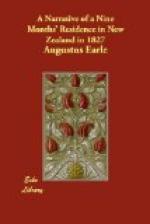I once saw, with indignation, a chief absolutely knocked overboard from a whaler’s deck by the mate. Twenty years ago so gross an insult would have cost the lives of every individual on board the vessel, but, at the time this occurred, it was only made the subject of complaint, and finally became a cause of just remonstrance with the commander of the whaler. The natives themselves (and I have heard the opinions of various tribes) have invariably told me that these things occurred from our want of knowledge of their laws and customs, which compelled them to seek revenge. “It was,” they said, “no act of treachery on our part; we did not invite you to our shores for the purpose of plunder and murder: but you came, and ill-used us; you broke into our tabooed grounds. And did not Atua give those bad white men into the hands of our fathers?”
I am confident that a body of Europeans may now reside in perfect security in any part of these islands. The late plundering of the missionaries at Whangaroa was a peculiar circumstance, which might have happened even in civilised Europe, had the seat of war approached so near their place of residence. If their houses and chapel had been on the plains of Waterloo during the June of 1815 they would not have experienced a better fate.
This recent tumult has brought a circumstance into notice highly interesting to all who may hereafter wish to settle here. It has hitherto been their custom, when an accident occurs, such as the sudden death of a chief, to make a general plunder of everything belonging to the family of the deceased, and all under their protection. A knowledge of this horrible custom has deterred many from settling in New Zealand; and even those who have resolved to run so great a risk have lived in a continued state of alarm, lest the death of their protecting chief should leave them at the mercy of a savage enemy.




